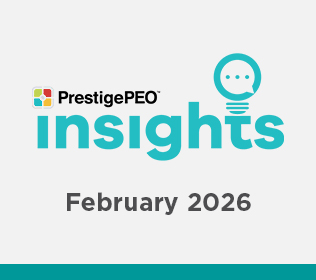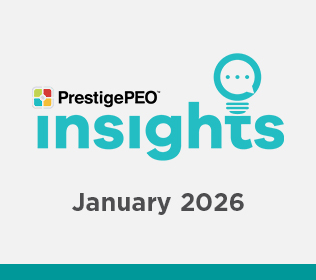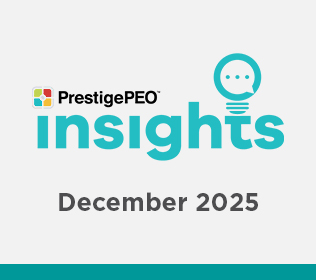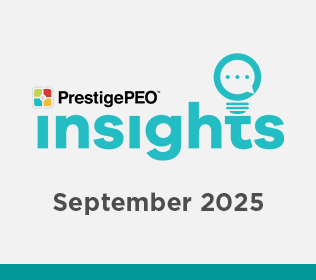
The latest news relevant to you and your business
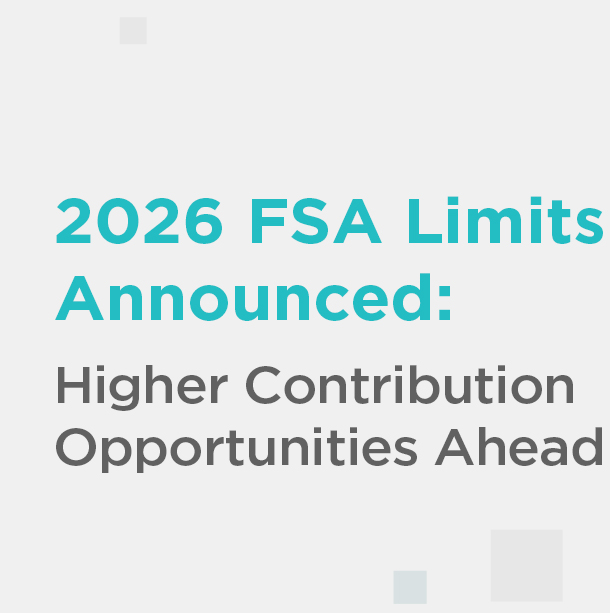

2026 FSA and Dependent Care Limits Rise
The IRS has announced new Flexible Spending Account (FSA) limits for 2026, giving employees greater flexibility to plan and save for healthcare and dependent care expenses.
For 2026, the Health FSA contribution limit will increase to $3,400, while the Dependent Care FSA limit will rise to $7,500 ($3,750 for married individuals filing separately). Additionally, the Health FSA carryover limit will increase to $680.
These updates present an opportunity to reassess contribution strategies for the year ahead. If you have questions about how these changes may affect your employees or your benefit plans, your PrestigePEO Benefits Team is here to help.

Navigating Compliance with Confidence
This month’s compliance updates outline the latest federal and state changes impacting employers, along with practical guidance to help you maintain compliance, protect your workforce, and plan with confidence for the months ahead.
- California Ban on Stay or Pay Provisions
- California Lawmakers Pass 12 Bills – Now Awaiting Signatures
- Colorado Supreme Court Clarifies Two-Year Limit on Minimum Wage Claims
- Delaware Pay Transparency
- DOJ Recognizes Occasional Teleworks as Religious Accommodation
- Florida Now Allows for Open Carry
- H-1B Visa Change
- Oregon Employers Face New Payroll and Hiring Rules
- Puerto Rico Passes Lactation Legislation
- Rhode Island Becomes First State to Pass Menopause Accommodations in the Workplace
- The Clock is Ticking to January 1 – Your Guide to Major State Paid Leave Rules
- USERRA Compliance Refresher
- Washington Employment Law Updates
To learn more about previous compliance updates, visit the Client Resource Center, select “managers,” and click the Compliance section.

It’s Time for Annual Sexual Harassment Prevention Training
Stay Compliant: Complete Your Required Annual Sexual Harassment Training
As the year draws to a close, it’s time to ensure your organization remains compliant with annual sexual harassment prevention training requirements.
Employers in California, Connecticut, Delaware, Illinois, Maine, Massachusetts, and New York are required by law to provide this training, and it’s strongly recommended for all employers to reinforce a safe, respectful workplace culture.
If your company operates across multiple states, be sure to review the specific training requirements for each. Your PrestigePEO HR Business Partner is here to help you confirm compliance and coordinate upcoming sessions.

AI, Compliance, and HR: Guidance for Business Owners & HR Leaders
Final Call: Join Our AI & HR Compliance Webinar
Last chance to register! Join us tomorrow, Wednesday, October 22, at 2:00 PM EST for an exclusive PrestigePEO webinar, “AI, Compliance, and HR: Guidance for Business Owners & HR Leaders.”
Our experts will break down how artificial intelligence is transforming HR, and what leaders must know to stay compliant, reduce risk, and prepare for the future of work.
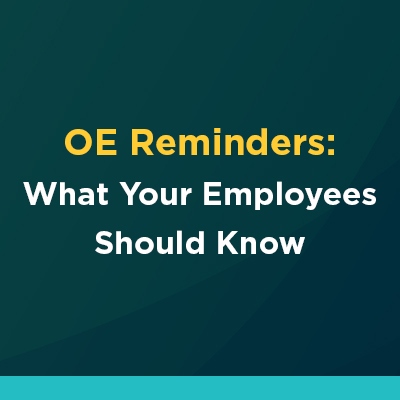
OE Reminders: What Your Employees Should Know
Guide Your Team Through a Smooth Start to the New Plan Year
As your trusted PEO partner, PrestigePEO is here to help your team make confident, informed benefits decisions, before and after Open Enrollment.
Before the Plan Year Begins:
Encourage employees to review their benefit confirmations carefully, verify dependent details, update life insurance beneficiaries, and reach out with any questions before coverage takes effect.
After the Plan Year Begins:
Once the new plan year begins, employees should review their first paycheck for accurate deductions and note that changes can only be made following a Qualifying Life Event (QLE), such as marriage, birth, or loss of coverage.
Together, we can ensure a smooth transition into the new benefits year and help every employee maximize their coverage. If you have any questions, contact your dedicated Benefits Specialist.

Retirement Solutions That Strengthen Your Workforce
Help Employees Build a Stronger Financial Future
A strategic 401(k) plan is more than a benefit: it’s a powerful tool for attracting, retaining, and supporting top talent.
Through our partnership with Slavic 401(k), PrestigePEO offers flexible retirement plans that make saving simple for employees and administration effortless for employers.
Provide your team with a trusted path to long-term financial security and show them you care about their future as much as their present.

Comprehensive Pet Coverage You Can Count On
Peace of Mind for You and Protection for Your Pets
Pets are family, and they deserve the same care and protection as the rest of your household. Through MetLife Pet Insurance, you can now access affordable coverage for unexpected accidents, illnesses, and routine vet visits.
Choose from flexible plan options, get reimbursed quickly, and gain peace of mind knowing your furry loved ones are covered when it matters most.

Make EAP Work for Your Team
Your Guide to Better EAP Results
An Employee Assistance Program (EAP) only delivers value when people use it, but low utilization is common when rollout, communication, or support is weak.
We simplify the process: turn-key activation, clear messaging, manager training, and ongoing engagement support ensure your clients get results, not just a program. Learn more by reading our blog below.

Your Top 7 Unemployment Questions, Answered
7 FAQs on Unemployment Every Employer Should Know
Managing unemployment claims can be confusing and risky, especially when mistakes carry serious costs.
In this article, we unpack the seven most frequently asked questions employers ask about unemployment, from handling base period claims to best practices for documentation and appeals. Use this as your go-to reference to stay compliant and proactive.
Know a business that could benefit from stronger HR support, premium employee benefits, and expert compliance guidance?
Refer them to PrestigePEO and earn up to $2,500 for every successful referral, with NO LIMIT on how many you can make.
Every connection is an opportunity to help another business thrive while earning rewards for yourself.

Navigating Compliance with Confidence
This month’s compliance updates outline the latest federal and state changes impacting employers, along with practical guidance to help you maintain compliance, protect your workforce, and plan with confidence for the months ahead.
California’s Upcoming Ban on “Stay-or-Pay” Provisions in Employment Contracts
Assembly Bill 692 (AB 692) has passed in the California legislature and is expected to be signed by the Governor in mid-October. Once signed, AB 692 will be effective as of January 1, 2026. AB 692 impacts employment contracts signed after January 1, 2026 and prohibits employers from entering into new “stay-or-pay” employment contracts with their employees. The new law explicitly prohibits contracts which:
“(A) Requires the worker to pay an employer, training provider, or debt collector for a debt if the worker’s employment or work relationship with a specific employer terminates.
(B) Authorizes the employer, training provider, or debt collector to resume or initiate collection of or end forbearance on a debt if the worker’s employment or work relationship with a specific employer terminates.
(C) Imposes any penalty, fee, or cost on a worker if the worker’s employment or work relationship with a specific employer terminates.” AB 692.
Are there exceptions under AB 692?
Yes, AB 692 allows for certain exceptions for tuition reimbursement agreements and retention bonus agreements. These exceptions each have five criteria, all of which must be met to qualify for the exception. One common element for such repayment agreements to be enforceable is that they must be a separate agreement from an employment contract. Other exceptions include loan repayment assistance programs provided by governmental agencies, contracts for enrolling in apprenticeships approved by the CA division of Apprenticeship Standards, and contracts relating to leasing or purchasing property, including contracts subject to the CA Residential Mortgage Lending Act.
PrestigePEO is here to help. If you have any questions regarding California’s new law, reach out to your HR Business Partner.
California Lawmakers Pass Twelve Important Employment Related Bills that Now Await the Governor’s Signature
As the 2025 California legislative session wraps up, lawmakers have been busy passing a number of employment related bills that now await the governor’s approval. Governor Newsom has until October 12, 2025, to either sign into law or veto this pending legislation. The discussion below highlights twelve workplace related bills that, if signed, will become effective January 1, 2026.
The use of artificial intelligence (AI) continues to be a focus for California lawmakers. Three separate bills address how California is attempting to legislate its use in the workplace.
- SB 7, also known as No Robo Bosses, would require employers to provide certain notices regarding the use of AI technology and automated decision systems (ADS) in workplace decisions and requires the use of a human reviewer of this ADS generated information when employers rely on it for employment decisions including discipline or termination.
- SB 53 addresses the development of large, scaled AI models (large frontier developers), or those that have greater than $500 million in annual revenue. The bill creates guardrails around the annual publication of risk thresholds, governance practices, and cybersecurity measures as well as heighten transparency requirements in reporting of intended uses, restrictions, and summaries of catastrophic risk assessment. Embedded in this legislation are critical safety incident reporting requirements and whistleblower protections that would protect employees responsible for assessing AI risks from retaliation for reporting safety concerns either internally or to regulators.
- SB 446: Data Breach Notification legislation addresses consumer data breach notification requirements, outlining that consumers must be notified within 30 calendar days of discovery of a data breach, and for those breaches that involve 500 or more Californians, the Attorney General must be subsequentially notified within 15 days. It is important to note that data breaches considered under this legislation include employee data, as well as the data of employee dependents, which could subject employers to penalties for both consumer data breach violations as well as any compromised data of minor children.
Immigration:
- AB 1136: The Immigration and Work Authorization bill would require employers to provide workers with up to five unpaid days per year to manage immigration related matters. This legislation will also provide employees with reinstatement rights for up to two years, should they be dismissed from employment due to lack of proper work authorization documentation and ultimately be able to provide it to a former employer.
- SB 294: Workplace Know Your Rights Act would require new workplace notifications alerting workers to newly created workplace rights that include protections against unfair immigration-related procedures and rights involving actions with law enforcement. It would also require employers to notify an employee’s emergency contact, if requested by the employee, should the employee be arrested or detained at the workplace.
Other Pending Legislation:
- SB 261: Unsatisfied Wage Judgments legislation outlines that any outstanding wage judgment that remains unpaid for 180 days after the time to file an appeal has lapsed would now be subject to a civil penalty of up to three times the outstanding wage judgment amount.
- SB 642: Job Posting and Equal Pay legislation modifies existing pay scale requirements in job posting to require that the pay scale be listed in “good faith” and extends the California Equal Pay Act statute of limitations for allegations of pay discrimination to three years and associated penalties to include the recovery of lost wages up to six years.
- AB 692: Stay or Pay Provisions would generally be prohibited by this pending legislation, which would make employment contracts entered into after 2025 that require an employee to pay an employer a sum of money if the employment relationship ends prematurely, unlawful, unless specific conditions are outlined in advance.
- AB 858: The existing COVID Rehire Rights law would be extended until January 1, 2027. This law provides rehire rights for certain hospitality related workers and specified workers in building services who were separated from work due to the COVID pandemic.
- AB 1326: Face Coverings would be designated as an individual right, permitting citizens to choose whether to wear one as a “health mask” in any public place, employment setting, or other workplace.
- SB 590: Current Paid Family Leave regulations would be modified to extend paid leave to eligible workers to care for a seriously ill designated person, which would be redefined as any blood relative as well as individuals who are the equivalent of family, to the eligible worker.
- SB 464: Pay Data Reporting would be modified to include mandatory civil penalties for failures to comply with reporting requirements as well as the addition of 13 job categories that would be included in pay data reports by 2027, for a total of 23 specific job categories.
Employers are encouraged to become familiar with how pending legislation may impact their business and stay vigilant about the potential for rapidly changing compliance obligations. We will continue to monitor the governor’s actions and provide necessary updates as they become available.
PrestigePEO is here to help. For guidance on this pending legislation or any other questions, please contact your HR Business Partner for assistance.
Colorado Supreme Court Clarifies Two-Year Limit on Minimum Wage Claims
The Colorado Supreme Court has ruled that claims under the Colorado Minimum Wage Act are subject to a two-year statute of limitations, or a three-year statute of limitations for willful violations. This decision resolves earlier uncertainty where some courts applied a six-year general limitations period. It aligns Minimum Wage Act claims with the Colorado Wage Claim Act and federal law. For employers, this limits exposure to old claims and confirms compliance with payroll record-keeping requirements. HR and payroll teams can now confidently rely on a two-year default window (three years for willful violations) when reviewing past wage and overtime issues, reducing legal uncertainty and administrative burden.
PrestigePEO is here to help your business maintain compliance. Contact your HR Business Partner with any questions or to discuss next steps.
Delaware – Pay Transparency
Another state has passed its own version of a pay transparency law, with Delaware passing House Substitute No. 2 for House Bill No. 105. Starting in 2027, Delaware employers with more than 25 employees will be required to include the compensation range on job postings; the posting must include the hourly rate range or the salary range along with other compensation, including benefits offered. However, if the benefit information is not included in the posting, employers must provide the information to applicants upon request or prior to any discussions relating to compensation for the position. This new requirement for employers will apply to job postings for both in-person and remote positions.
There are a few exceptions under the law, including job postings for positions governed by a Collective Bargaining Agreement and/or postings for positions that are for urgent, immediate hire. Additionally, if there is a scenario in which a third party posts or re-posts a position without knowledge of the employer, the employer will not be held responsible if the posting by the third party does not include the positions hourly rate or salary range.
Employers who are found to have violated the law will face disciplinary action ranging from written warnings to fines of up to $10,000. This will be enforced through administrative proceedings under the Department of Labor.
PrestigePEO is here to help. Contact your HR Business Partner if you have any questions.
DOJ Recognizes Occasional Telework as a Religious Accommodation
The U.S. Department of Justice (DOJ) recently announced that federal agencies must consider occasional, or “situational,” telework as a potential religious accommodation under Title VII. This means that even when agencies have overall return-to-office policies, they still need to review individual requests for remote work related to an employee’s religious beliefs or practices.
Telework, also known as telecommuting, is a flexible work arrangement where employees work remotely and perform their job duties from an approved alternative location, such as their home, instead of a traditional office. They use telecommunications technology to communicate and complete tasks. The DOJ described “situational telework” as infrequent or one-time, not a recurring or permanent schedule. The guidance emphasizes that requests should be considered on a case-by-case basis.
Although the DOJ’s guidance is specifically for the federal workforce, the Equal Employment Opportunity Commission (EEOC) might follow similar reasoning in private-sector enforcement. It indicates to all employers that occasional telework can be a reasonable accommodation for religious reasons.
Related guidance and enforcement actions suggest that telework can be a valid accommodation when it enables employees to participate in religious observances and avoid missing work.
Employers should review their accommodation policies and ensure managers are trained to evaluate religious accommodation requests fairly and consistently. When reviewing requests for religious accommodations, employers should have open discussions with employees and consider inventive solutions, such as short-term or situational telework, unless it would cause significant business hardship.
PrestigePEO is here to help. Contact your HR Business Partner for support.
Employment Considerations as Florida Now Allows Open Carry of Firearms
In September, a Florida appeals court overturned the state’s prohibition against citizens openly carrying firearms in public. Despite having conflicting rulings in other state appellate courts, Florida’s Attorney General has now confirmed that this ruling applies statewide.
What does this mean for employers?
While legal challenges may eventually surface, it is important to understand that this decision only applies to public property. Private property owners will continue to maintain the ability to restrict firearms on their property, at their discretion, which extends to private employers, as well. Therefore, employers may prohibit employees from openly carrying firearms inside the workplace.
This decision does not, however, impact existing Florida law that allows employees to store firearms in their locked vehicles on work property and under current self-defense regulations, employees are permitted to remove firearms from their locked vehicles for self-defense purposes.
Furthermore, employers continue to be prohibited from searching employee vehicles for stored firearms, even if the vehicle is on an employer’s private property. Any blanket policy prohibiting the possession of firearms on company property may violate this existing law.
Employers are encouraged to review their firearms policies to ensure compliance with both new and existing laws. We will continue to monitor these changes and provide updates as they become available.
PrestigePEO is here to help. Please contact your HRBP for questions or assistance with these new regulations.
The Trump Administration Institutes a $100,000 Fee for H-1B Visas and Proposes Additional Changes, the DOL Announces the Launch of Project Firewall, and New Legislation Aimed at H-1B and L-1 Visa Reform is Introduced; What Employers Need to Know
New H-1B Visa Fee
In another move in the Trump administration’s immigration reform efforts, President Trump executed a proclamation aimed at requiring a new, one-time $100,000 fee for each new H-1B visa petition. This significant fee will largely impact the technology industry as well as other STEM fields and will apply to any new H-1B visa petition filed after midnight on September 21, 2025.
Designed to bring foreign workers from specialized fields to the United States on a temporary, three to six-year basis, the H-1B visa program generally grants 65,000 visas annually, plus an additional 20,000 visas set aside for workers who maintain advanced degrees from U.S. colleges or universities. Due to demand, the H-1B visa program is subject to a lottery system. Traditionally, fees associated with the H-1B process are covered by the employer and can already top several thousands of dollars.
Legal challenges to this new fee have already surfaced and are expected to increase by business owners and other stakeholders. On October 2, 2025, a united group of immigration advocacy organizations and impacted employers filed a lawsuit in the U.S. District Court for the Northern District of California challenging the new 100K fee contending that this fee is a violation of the law, imposed without the proper protocols being followed, and is expected to result in significant harm to the U.S. workforce and public interest. PrestigePEO will continue to this monitor these legal challenges.
Proposed Changes to H-1B Visa Registration
A Proclamation released on September 19, 2025, entitled Restriction on Entry of Certain Nonimmigrant Workers seeks to direct the Department of Labor (DOL) and Department of Homeland Security (DHS) to revamp prevailing wage levels and modify H-1B visa registration to a weighted scheme.
These efforts to change the prevailing wage levels seek to eliminate what the Administration views as abuse by employers to employ lower-paid, lower-skilled workers instead of workers from the “highly skilled American” workforce, otherwise allowing the incentivization of “artificially low labor costs” through the program’s current set-up.
Specific modifications aimed at creating a weighted selection process for registrants and petitioners were proposed on September 24, 2025, with public comment open until October 24, 2025. This proposed weighted structure change would replace the current H-1B lottery drawing to a structure that provided more “entries,” or admission possibilities to those H-1B registrations with the highest Bureau of Labor Statistics Occupational Employment and Wage Statistics (OEWS) wage levels, therefore the higher the wage level, the increased number of “entries.” The increased odds of gaining H-1B registration through higher wages is the Administration’s efforts to shift the H-1B program to those workers earning higher-wages in higher-skilled positions.
Should these proposed changes take place, small and medium-sized businesses will likely feel the most direct impact as they budget for the necessary higher wage structures. There would also likely be an overall reduction in the number of entry-level H-1B positions available.
Project Firewall
In late September, the Department of Labor initiated Project Firewall, signifying renewed enforcement efforts focused on H-1B visa compliance standards. Under this initiative, it is anticipated that DOL will ramp up investigations and program-wide audits, including those involving labor condition applications (LCA) and H-1B wage and hour standards. Investigations are expected to increase in areas where both H-1B visa violation complaints have been made to the department as well as where no outside complaint has been made. Collaboration between the DOL and other government agencies is expected and will include sharing investigative findings and enforcement conclusions, resulting in the possibility of further government agency enforcement efforts and subsequent penalties.
H-1B wage and hour violations can result in severe penalties including back wages, fines, and may include formal exclusion from the H-1B program. Employers are encouraged to review their H-1B workforce documentation and ensure that:
- For each LCA (labor condition application), all Public Access File documentation is accurate and complete.
- The job titles, the Standard Occupational Classification (SOC) codes, and wage rates are consistent with job descriptions and duties.
- Confirm on a regular pay-period basis, that all wage and hour requirements are met pursuant to the related LCA.
- Train all staff members responsible for H-1B management in H-1B compliance obligations, audit procedures, and internal escalation protocols, as well as develop a plan on how to respond to potential government investigations.
New Legislation Aimed at H-1B and L-1 Visa Reform is Introduced
In early October, a bi-partisan bill was introduced in the Senate entitled H-1B and L-1 Visa Reform Act of 2025. This bill seeks to demand stricter requirements on H-1B and L-1 visa employers, stiffen eligibility criteria, and increase enforcement powers to the Department of Labor and Department of Homeland Security. While it is not yet known if the bill will be taken up in Congress, it signifies increasing efforts to restructure employment-based immigration in this country. PrestigePEO will continue to closely monitor these developments.
PrestigePEO is here to help and will continue to monitor these developments. For guidance or any other questions, please contact your HR Business Partner for assistance.
Oregon Employers Face New Payroll and Hiring Rules
Oregon has enacted several new workplace laws that will take effect by early 2026; employers should prepare for these changes. The most significant impact will be on payroll disclosures and hiring practices, which will require employers to provide detailed explanations of payroll codes, itemized deductions, and pay reads to employees upon hire.
Oregon already requires employers to provide employees with detailed written wage statements, including pay rates, gross and net wages, itemized deductions, and regular and overtime hours worked by non-exempt employees, along with their corresponding pay.
Starting January 1, 2026, employers will be required to disclose significantly more information related to the employee’s pay and pay stub to employees at the time of hire.
Oregon SB 906 amends the law to require employers to provide new hires with a written explanation of all payroll codes, deductions, and pay rates to which they may be eligible. This includes details about benefits, allowances, and the purpose of any deductions. Employers are required to update this information annually. To assist, Oregon’s Bureau of Labor and Industries (BOLI) has developed a template in English and Spanish that employers may adapt to meet this notice requirement. Companies that fail to comply may face penalties of up to $500 per violation.
Other new laws include a ban on asking job applicants about their age, date of birth, or graduation year before an interview or job offer, and a requirement to allow employees to use sick leave to donate blood through approved programs as of January 1, 2026. Additionally, striking workers will be able to collect up to ten weeks of unemployment benefits starting in 2026, making Oregon the first state to provide this benefit to both private and public sector workers.
Oregon employers should start reviewing payroll codes, onboarding materials, job applications, and sick leave policies now to ensure compliance before these new rules take effect.
PrestigePEO monitors significant legal changes to help our clients adapt accordingly. For specific questions or assistance, reach out to your HR Business Partner.
Puerto Rico Passes Lactation Legislation: What Employers Need to Know
On August 1, this US territory both passed and immediately enacted groundbreaking legislation that requires public and private employers to permit part-time and full-time breastfeeding mothers a reasonable period to either breastfeed or express milk during the workday, without a reduction in pay. A reasonable period of time has been defined as at least one hour per day for these purposes. Employers must notify workers of their rights under this new legislation and also provide a private, clean space with a lockable door, electrical outlets, seating, water access, and refrigeration in order to be compliant with the law. The lactation space cannot be a bathroom. Furthermore, employers are no longer allowed to require medical documentation to support an employee’s request under this legislation and employees are permitted to use lactation breaks for at least 12 months follow return from maternity leave, with a right to extent this time, if needed.
Employer retaliation for exercising these newly enacted rights is prohibited as is any related discipline. Employers are further prohibited from considering the use of lactation breaks adversely in work-related decisions such as performance evaluations, promotions, bonus structures, or work assignment distribution.
Consequences for failure to comply include administrative, civil, and/or criminal penalties. The Puerto Rico Women’s Advocate Office (OPM) and the Puerto Rico Department of Labor are authorized to investigate alleged violations and issue related penalties. Employees maintain a private cause of action against employers as well.
Employers are encouraged to review their current policies to ensure compliance with the new regulation, address the need for a compliant lactation space, and notify employees of the same. Employee handbooks, policies, and associated procedures should be reviewed for compliance, and all necessary staff should be trained on the new requirements.
PrestigePEO is here to help. Please reach out to your HRBP for questions or assistance.
Rhode Island Becomes First State to Pass Legislation to Provide Menopause Accommodations in the Workplace
On June 24, 2025, Rhode Island signed into law the country’s first piece of legislation aimed at supporting women in the workplace experiencing menopausal symptoms under the state’s fair employment statute. Rhode Island’s fair employment statute includes provisions to prohibit workplace and hiring discrimination and support accommodations relating to pregnancy and childbirth. The new legislation, signed by Governor Daniel McKee, expands those protections and accommodations to women experiencing menopause and adds it as a protected condition. The law expands the definition to include ‘the need to manage the effects of vasomotor symptoms,” referred to as “hot flashes”.
Employers in this state are now required to engage in good faith and timely processes to identify reasonable accommodations for individuals with menopause symptoms that affect an individual’s capacity to perform essential job functions. Notice of these new protections must be prominently displayed within the workplace and provided to new employees upon hiring and to current employees by October 22, 2025. An employee that has notified an employer of any menopausal-related conditions or symptoms that are experienced must be given notice of the right for accommodation within 10 days.
For more information about this legislation you can find Rhode Island H6161 on the state’s General Assembly website.
As always, PrestigePEO is here to help with payroll and compliance needs. For questions regarding these new regulations or other matters, please contact your HRBP for assistance.
The Clock Is Ticking to January 1: Your Guide to Major State Paid Leave Rules
As we have been reporting, starting in mid-2025 and running through 2026, many states are rolling out or expanding paid family, medical, and sick-leave laws. These changes affect payroll deductions, leave accruals, eligibility, job protection, and health-benefit continuation. Below is summary of what is changing in each state, complete with effective dates and key employer responsibilities, to help ensure compliance with necessary policy and system updates as well as timely notice requirements.
Alaska — Paid Sick Time: Alaska’s statewide paid sick time began July 1, 2025, and will continue to phase in additional requirements during 2026. Employees earn one hour for every thirty hours worked. Employers with fifteen or more employees must allow up to fifty-six hours per year, while smaller employers may cap at forty. Unused hours carry over, so set up payroll accrual tracking and provide the required notices.
Colorado — Paid Family and Medical Leave (NICU expansion):
Effective January 1, 2026, Colorado’s Paid Family and Medical Leave (FAMLI) program will expand to provide an additional 12 weeks of paid leave to a parent whose newborn requires care in a Neonatal Intensive Care Unit (NICU). This is in addition to the standard 12 weeks already available, allowing up to 24 total weeks of paid, job-protected leave in the same benefit year. Job protection and wage replacement will continue under existing Colorado FAMLI rules, which provide partial wage replacement funded through state-administered contributions. Employers offering short-term disability (STD) or paid parental leave should ensure benefits coordinate with FAMLI so total payments do not exceed 100% of wages. Employers should also update return-to-work and benefit coordination procedures to reflect the longer entitlement period.
Connecticut — Paid Sick Time and Family/Medical Leave:
Effective October 1, 2025, non-certified school staff will gain job-protected family and medical leave under Connecticut law. Beginning January 1, 2026, employers with eleven or more employees must provide up to forty hours of paid sick time per year, accruing at a rate of one hour for every thirty hours worked. Employers are strongly encouraged to prepare in advance of these changes by reviewing and updating relevant policies and systems. Specifically, employers should implement or enhance accrual tracking processes—for example, by using timekeeping systems such as Kronos—to accurately monitor leave accrual and usage. In addition, employers should work with their HR Business Partners (HRBPs) to update employee handbooks and leave policies to reflect the new requirements and ensure compliance. Finally, be sure to post all required state notices as issued by the Connecticut Department of Labor.
Delaware — Paid Family and Medical Leave: Payroll contributions began on January 1, 2025, and employees may begin filing claims on January 1, 2026. Employers with ten or more employees in Delaware must participate in the state’s Paid Family and Medical Leave (PFML) program. Employers with twenty-five or more employees are required to provide the full range of benefits, including parental leave, family caregiving leave, medical leave for the employee’s own serious health condition, and military family leave.
Eligible employees may receive up to twelve weeks of paid parental leave or six weeks of leave to care for their own or a family member’s serious health condition, with wage replacement of up to eighty percent of the employee’s average weekly wage, capped at $900 per week. Amendments effective July 30, 2025, prohibit employers from requiring employees to use other paid time off before accessing PFML benefits and streamline private-plan administration for employers that choose to offer an approved equivalent plan.
District of Columbia — Short-Term Disability and Paid Leave Coordination: Effective May 1, 2025, short-term disability benefits may not be reduced because an employee also receives the city’s paid leave. Update plan documents and payroll to avoid offsets.
Hawaii — Paid Family and Medical Leave: Hawaii’s statewide paid family and medical leave program is expected to begin in 2026, though the state has not yet finalized the exact effective date. The program will provide up to twelve weeks of paid family leave and up to twenty-six weeks of paid medical leave for an employee’s own serious health condition, funded through payroll contributions. Employers will need to coordinate benefits with Hawaii’s existing Temporary Disability Insurance (TDI) program to avoid overlapping wage replacement. Employers are encouraged to monitor updates from the Hawaii Department of Labor and Industrial Relations (DLIR), update handbooks, leave policies, and payroll systems to ensure compliance, and post required employee notices once official guidance is released.
Illinois — Military Funeral Honors, Lactation, Donation, and Leave: On August 1, 2025, covered employers must provide up to eight paid hours per month (capped at forty per year) for military funeral honors. On January 1, 2026, paid lactation breaks and expanded blood and organ donation leave take effect. On June 1, 2026, the Neonatal Intensive Care Leave Act grants ten unpaid days (employers with sixteen to fifty employees) or twenty unpaid days (fifty-one or more). Neonatal leave is separate from federal family and medical leave and cannot require using accrued paid time off first.
Indiana — School Conference Leave: In 2026, employers must allow unpaid time for parents to attend a child’s school conferences or meetings, with at least five days’ notice and reasonable documentation. A request may be denied if already used once that year or if the time requested exceeds what is needed.
Iowa — Paid Family and Medical Leave: Payroll deductions began January 1, 2025, and benefits start January 1, 2026. Covered reasons include bonding with a new child, caring for a family member, or addressing an employee’s own serious health condition. The program provides wage replacement funded through payroll contributions. Employers are encouraged to review and upload contribution tables, align internal leave policies, and establish a simple process to coordinate company leave programs with state benefits to ensure smooth administration and compliance.
Kansas — Paid Sick Time: Effective January 1, 2026, employees will accrue one hour of paid sick time for every thirty hours worked. Employers may set a reasonable annual cap on accrual or use, and under the state’s guidance, many are expected to limit annual use to up to eighty hours, which is permitted as long as the policy is clearly communicated and applied consistently. Employers may request medical documentation after three consecutive missed workdays. To prepare, employers should implement an accrual tracking system, update policies, and post the required state notice once it becomes available.
Kentucky — Paid Sick and Safe Leave: Beginning January 1, 2026, employers with eleven or more employees must provide paid sick and safe leave; the requirement expands to all employers on January 1, 2027. Accrual (not accuracy) occurs at a rate of at least one hour for every thirty hours worked, and employers may cap annual use at forty hours. Leave may be used for an employee’s own illness, to care for a family member, or for safety-related needs connected to domestic violence, sexual assault, or stalking. Employers must maintain confidentiality regarding any information shared and establish clear non-retaliation procedures to protect employees who use this leave.
Louisiana — Paid Family and Medical Leave: Payroll deductions began January 1, 2025, and benefits will start on May 1, 2026. Employees may receive up to twelve weeks of paid leave to bond with a new child, caring for a family member, or addressing their own serious health condition. Employers should verify payroll deductions for accuracy, update internal leave procedures, and post required state notices once issued. In addition, employers should create a clear claims support checklist and train HR staff to help employees navigate the application process and coordinate company leave benefits with the state program.
Maine — Paid Family and Medical Leave: Contributions began January 1, 2025, and benefits start May 1, 2026. Employees may take up to twelve weeks per year for their own health, family care, bonding, certain military needs, and safe leave. Eligibility generally requires one hundred twenty days of employment and earnings of at least six times the state average weekly wage; employers with fifteen or more employees pay a higher share, and comparable private plans may qualify.
Maryland — Paid Family and Medical Leave: Benefits begin July 1, 2026, with weekly payments ranging from fifty to one thousand dollars through 2028. An “anchor date” will set the application year and wage calculation. Prepare for mid-year deductions, new notices, and claims handling that follows the anchor-date rules.
Massachusetts — Paid Family and Medical Leave Benefit Cap: On January 1, 2026, the maximum weekly benefit rises to $1,230.39 while the contribution rate remains the same as 2025. Employers with private plans must confirm their benefits still meet or exceed the higher cap and continue allowing employees to top off with accrued paid time off.
Minnesota — Paid Family and Medical Leave: Benefits under Minnesota’s Paid Family and Medical Leave program begin January 1, 2026. Employers must post the state notice and distribute written information to employees by December 1, 2025, begin payroll deductions on January 1, 2026, and submit the first premium payment by April 30, 2026. Employees may take up to 12 weeks of medical leave and 12 weeks of family leave, with a maximum of 20 weeks combined per benefit year. Most workers will receive approximately 55%–90% of their average weekly wage, up to the state’s average weekly wage cap. Coverage includes full-time, part-time, and temporary employees, and independent contractors may opt in voluntarily.
Nebraska — Paid Sick Time: Effective October 1, 2025, Nebraska’s Paid Sick Time law requires employers with 11–19 employees to provide up to 40 hours of paid sick time per year, and employers with 20 or more employees to provide up to 56 hours per year. Employees will accrue one hour of paid sick time for every 30 hours worked after completing 80 consecutive hours of work in Nebraska. The model notice refers to a state-issued document that outlines employees’ rights and employer obligations under the Paid Sick Time law. It will include key details such as how sick time accrues, eligible uses, carryover rules, and protection from retaliation. Employers are required to provide this notice to all employees, post it in a visible workplace location, and include paid sick time balances and year-to-date usage on each employee’s pay stub or statement to ensure compliance and transparency.
New York City — Earned Safe and Sick Time (City Amendments): Council approved Sept 25, 2025; effective 120 days after the mayor signs (watch for final date). This pending legislation will add a separate 32-hour unpaid bank available at hire each year (no carryover) and 20 hours of paid prenatal leave and expands reasons for use to include public disasters and workplace violence. Most Temporary Schedule Change Act duties go away because those reasons move under sick/safe leave.
Pennsylvania (Pittsburgh) Paid Sick Time: Effective January 1, 2026, employers with 15 or more employees must provide up to 72 hours of paid sick time per year, while smaller employers must provide up to 48 hours per year. Employees will continue to accrue one hour of paid sick time for every 30 hours worked. Employers should review and adjust their current paid sick leave caps, carryover limits, and employee communications to ensure consistency with the new requirements. This includes updating written policies and handbooks, training managers on accrual and usage rules, and clearly communicating available leave balances and rights to employees to maintain compliance and transparency.
Rhode Island — Temporary Caregiver Insurance and Donor Leave: As of Jun 24, 2025, you must give reasonable accommodations for menopause-related conditions and deliver a rights notice to new hires and to employees who report pregnancy or menopause. On Jan 1, 2026, Temporary Caregiver Insurance increases from 7 to 8 weeks, and new paid donor leave begins (up to 30 days for organ donation; 5 for bone marrow).
Virginia — Paid Sick Leave: Beginning July 1, 2026, all employers must provide paid sick leave accruing at least one hour per thirty hours worked, typically capped at forty hours per year. Build accrual tracking, a clear request process, and non-retaliation protection.
Washington — Paid Family and Medical Leave: Beginning January 1, 2026, job protection under the state’s family and medical leave law will expand to employers with 25–49 employees, then to 15–24 employees on January 1, 2027, and finally to 8–14 employees on January 1, 2028. Employees become eligible for job protection after 180 calendar days of employment with their employer. Employers must continue group health insurance coverage during any period of job-protected leave and must allow employees to use leave in increments as small as four hours. Employers may count federal Family and Medical Leave Act (FMLA) leave toward the state’s job-protection entitlement if they provide the required written notices within five business days of the FMLA designation and continue to provide monthly status updates thereafter. To maintain reinstatement rights, employees must return to work on their scheduled return date following leave.
Advice to Employers
Employers are encouraged to remain vigilant about upcoming effective dates and new compliance obligations in the states where they operate. Staying ahead of these changes helps ensure that policies, payroll systems, and employee communications remain compliant and consistent. Employers should also review when health coverage must continue during leave, how disability and paid leave programs interact, and where private plans must match state benefits.
Training managers on eligibility, documentation limits, confidentiality, non-retaliation, job-protection timelines, and shorter leave increments is essential to maintain compliance and minimize risk. In addition, standardizing forms, confirming how federal and state leave run concurrently, and auditing pay calculations across all pay types will support clear and accurate implementation.
PrestigePEO is here to help your business maintain compliance. Contact your HR Business Partner with any questions or to discuss next steps.
USERRA Compliance Refresher
A recent finding from the Bureau of Labor Statistics reported nearly 90,000 instances of individuals missing at least a week of work between January and August due to military deployment, jury duty, or civil service. This amount is a 19-year high dating back to 2006 as the Trump administration ramps up deployments of the National Guard to cities across the country. This figure is nearly doubled from the same time frame in 2024.
With the increase in military deployments, employers and employees should consider what rights and obligations are afforded to those individuals who must take these absences. Under the Uniformed Services Employment and Reemployment Rights Act (USERRA), military service members and veterans are protected from employment discrimination on the basis of their service, and allows them to regain their civilian jobs following a period of uniformed service. USERRA applies to members and veterans of the Armed Forces, Reserves, National Guard, and other “Uniformed Services” (including the National Disaster Medical System, FEMA Urban Search & Rescue, FEMA Reservists, and the Commissioned Corps of both the Public Health Service and NOAA). The law is extended to all employers, including public entities, and ensures that service members:
- Are not disadvantaged in their civilian careers because of their military service;
- Are promptly re-employed in their civilian jobs upon return from duty; and
- Are not discriminated against by employers because of past, present, or future military service.
Employee Obligations
In order to be eligible under USERRA, employees must demonstrate that they meet four conditions. Those conditions require that:
- Individuals provide advice notice of service to an employer;
- Cumulative service with a particular employer does not exceed five years;
- Individuals must be released from service under honorable conditions; and
- Individuals must report back to a civilian employer or submit a timely application for reemployment after completing service.
For employees to request reemployment, they must do so within specific timeframes following their service.
- If the length of service is less than 31 days, the request must be made the next workday.
- If the length of service is 31 to 180 days, the request must be made within 14 days.
- If the length of service is over 180 days, the request must be made within 90 days.
During service, employees may elect to continue employer-based health coverage for up to 24 months. Upon reemployment, employers must restart benefits for the covered employee without waiting periods or exclusions.
Employer Obligations
Employers must be aware and remain compliant with USERRA guidelines and should have Supervisors complete annual training. Supervisors must advise employees of these rights and benefits and must approve requests for absence due to military service.
For position restoration for covered employees, employers must adhere to requirements based upon length of service.
- Less than 90 days: Employer must restore/reemploy in the position employee would have attained had he/she never left or to prior position of record if unable to acceptably perform after reasonable efforts to train employee for the position he/she would have otherwise attained.
- 91 or more days: Employer has the option to restore/reemploy in the position employee held; however it must be of like seniority, status and pay with full seniority.
- Disabled employees: If the employer is unable to place employee with disability in position of record, they must place in a position for which he/she qualifies with same seniority, status, and pay or nearest approximation. The “undue hardship” evaluation remains applicable.
Employers should be aware of their obligations under USERRA given the possibility for more deployments in the coming months. Employees who believe that they were subject to a USERRA rights violation may file a complaint with the U.S. Department of Labor or the Merit Systems Protection Board.
For more information, employers and employees may consult with the information provided by the Department of Labor, the U.S. Office of Special Counsel, or the Department of Veteran Affairs.
As always, PrestigePEO is here to help with payroll and compliance needs. For questions regarding these regulations or other matters, please contact your HR Business Partner for assistance.
Washington Employment Law Updates
As the 2025 Washington legislative session concludes, several new employment laws and amendments will take effect, impacting businesses across the state. Many changes have already been implemented, with others scheduled for 2026 and later.
Mass Layoff and Business Closure Notice Requirements: Washington’s new “mini-WARN” law mandates that employers with 50 or more employees provide 60 days’ notice to the state and affected workers before conducting mass layoffs or closing their business. Employees on Washington Paid Family and Medical Leave (WA PFML) are generally protected from these layoffs.
Driver’s License Requirements: Employers cannot require a valid driver’s license as a condition of employment or in job postings unless driving is an essential job function or directly related to a legitimate business purpose. Violations may result in penalties.
Employee Access to Personnel Files: Employees now have the right to request and receive their personnel files within 21 days at no cost, including applications, performance evaluations, disciplinary records, leave records, payroll records, and agreements. This law creates a private cause of action including damages and attorneys’ fees for non-compliance.
Paid Sick Leave for Immigration Proceedings: Employees may use paid sick leave to prepare for and attend immigration proceedings for themselves or family members.
Equal Pay and Opportunities Act Updates: The law clarifies pay transparency requirements for job postings and internal promotions, mandating disclosure of compensation and benefits information in job advertisements.
Paid Family and Medical Leave Changes (Effective 2026): Washington’s PFML program will expand job restoration protections for employees of smaller employers in phases. In 2026, employees who have worked at least 180 days for an employer with 25 or more employees will be eligible. In 2027, coverage extends to employers with 15 or more employees, and in 2028, to employers with eight or more employees. Employers must maintain current health insurance benefits for employees eligible for job protection during leave; however, coverage may be suspended if the employee fails to pay their portion of the premium. The minimum claim duration decreases from eight hours to four, allowing partial-day claims.
Domestic Violence Leave Expansion: Washington’s Domestic Violence Leave law protections now also cover victims of hate crimes, including online incidents. Employers must provide reasonable unpaid leave and accommodations to ensure safety.
Consideration of Job Applicants’ and Employees’ Criminal Records: The Fair Chance Act Amendments limit how employers can consider criminal records. Employers may not automatically disqualify applicants based on their criminal history or inquire about it until after a conditional job offer. Disqualifications based on convictions are permitted only for legitimate business reasons. Specific notice and review procedures must be followed before any adverse action is taken.
Employers should review hiring, leave, and personnel policies and train managers to ensure compliance with these new rules.
PrestigePEO is here to assist. Contact your HR Business Partner for support.
Additional State Updates for October 2025
- California: Effective October 1, 2025, final employment regulations governing the use of ADS information and AI in employment-related decisions require that they must comply with anti-discrimination laws.
- Maryland: Effective October 1, 2025, the Earned Wage Access law will allow employees to access earned but unpaid income through providers offering earned wage access services.
- Montana: Effective October 1, 2025, employers are prohibited from terminating an employee due to service as a volunteer emergency services provider, under the Volunteer Emergency Service Provider Protection bill.
PrestigePEO is here to help your business maintain compliance. Contact your HR Business Partner with any questions.
Feedback
Have ideas for our next newsletter? We’d love to hear from you! Whether it’s suggestions, questions about our services, or program inquiries, our team is here to help.
Email us at marketingteam@prestigepeo.com to share your thoughts or learn more. Let’s collaborate and grow together!

